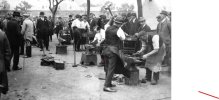Although Blacksmiths are often thought of as just horse shoe-ers, in fact they often were general iron workers too - agricultural engineers in the country, making and fixing farm equipment like ploughs and harrows, and machinery repairers in urban areas.
'Smith' was a generic name for metal workers, so there were goldsmiths and silversmiths who worked with those precious metals.
I doubt if your grandfather actually made money, but as a blacksmith I suppose he would repair the machinery that did, if it should break.

